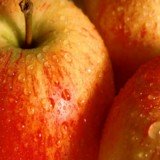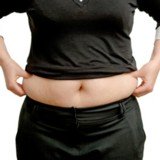Bacon Nutrition Facts
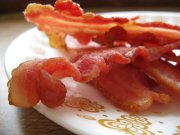 Bacon together with sausage, ham, pepperoni and a few others are processed or cured meats. For a long time they have been classified under the foods to avoid. And we are not here to dispute that, just trying to put a balance on the scale. The foods we eat really are up to us as an individual but we need to be careful on how much of certain foods we eat and how often.
Bacon together with sausage, ham, pepperoni and a few others are processed or cured meats. For a long time they have been classified under the foods to avoid. And we are not here to dispute that, just trying to put a balance on the scale. The foods we eat really are up to us as an individual but we need to be careful on how much of certain foods we eat and how often.
Bacon is just one of those foods/ meats that one can get hooked on. Despite its fat, cholesterol and sodium content. In most cases, those who consume it don't really know the facts about the nutrition of bacon. This is the purpose of this article; to give you a little insight on just what exactly you're putting into your system.
Bacon is mostly prepared from two back cuts, i.e fatback (which is mostly pure fat) and pork loin (which is the leaner type of bacon).If you want to eat healthy you would rather go for the lean cuts of bacon. They may not perhaps taste as good as the fatty slices but if you want to lead a healthy eating lifestyle you may need to ditch them!However, you will notice that most of the "healthier cuts" of bacon will cost a bit more than the streaky or side bacon. These are quite fatty and have layers of fat running parallel to the rind. However, you will find that turkey bacon for instance contains less fat, so you may opt for it instead.
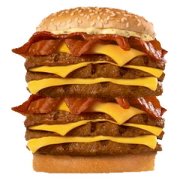 It really is amazing how individuals have become "addicted" to bacon. There are many dishes that have been created which include bacon. A few examples include the common BLT (Bacon, Lettuce and Tomato) Sandwiches, Wendy's Double and Triple Baconator (which is one of the signals of how food serving sizes have increased over the years),Chocolate covered bacon, as toppings on pizza and salads, and there's even bacon jam! In fact, the love for bacon has grown so much that there's even bacon air freshener, band aids and scarfs! Now that's an obsession.
It really is amazing how individuals have become "addicted" to bacon. There are many dishes that have been created which include bacon. A few examples include the common BLT (Bacon, Lettuce and Tomato) Sandwiches, Wendy's Double and Triple Baconator (which is one of the signals of how food serving sizes have increased over the years),Chocolate covered bacon, as toppings on pizza and salads, and there's even bacon jam! In fact, the love for bacon has grown so much that there's even bacon air freshener, band aids and scarfs! Now that's an obsession.
So what about health? What is it about bacon that there's a racket about? There have been health concerns over the nitrates and nitrites that are found in bacon. These have been linked to some cancers and heart diseases. Also, because of the fat and sodium content, one may be at the risk of getting diseases such as hypertension (which itself may trigger other adverse health effects such as kidney problems, stroke, heart attack, etc). This will of course be in addition to the fact that your diet overall. If you generally consume things that are high in their sodium content you may be at risk of getting high blood pressure.
Bacon Nutrition Facts Fiber, Protein, Fat and Sugar
Generally speaking, you will find that in most cases bacon is not a source of dietary fiber. With the exception of bacon bits, which you will find in this article provide one with about 40% of your recommended daily value of fiber. All the others are just a source of the nutrient, containing 4% of the RDA (recommended daily allowance) or no content at all. When it comes to Protein, because bacon can be included in the meat group of the food pyramid diagram, is a source of protein. It may not contain as much Protein as eggs for instance, but it does give one some protein.
The fat issue, as we mentioned earlier, bacon contains a fairly high amount of fat. Most of this fat is saturated fat. Bacon fat is used in many different ways. It can be used as part of a salad dressing, for cooking or as an all purpose flavoring for things such as gravy, etc. Having said all this, moderation is important when you are consuming bacon. In fact, moderation is important in everything you do including eating. Over-indulging has its consequences;). We will now take a look at some bacon nutrition facts. The percent daily values (DV) are based on a 2,000 calorie diet. Your values may be higher or lower depending on your daily calorie needs.
1 slice Cooked, Baked Pork Bacon Nutrition Facts
These nutrition facts on a slice of baked pork bacon reveal that it is high in Sodium, Saturated fat and Total fat. It however is a source of Protein, Iron, Riboflavin, Niacin, Vitamin B6, Vitamin B12, Pantothenic Acid, Magnesium, Phosphorus, Potassium, Zinc, Copper and Selenium. Although in most cases these minerals and vitamins are supplying you with just 1%, they have great benefits for your body.
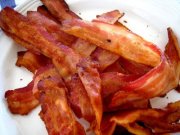
- Serving size- 1 slice cooked (8.1g)
- Calories- 44
- Calories from Fat- 30
- Total Fat- 3.5g, 5% DV
- Saturated Fat- 1.1g, 6% DV
- Cholesterol- 10mg, 3% DV
- Sodium- 180mg, 7% DV
- Total Carbohydrate- less than 1g, 0% DV
- Dietary Fiber- 0g, 0% DV
- Sugars- 0g
- Protein- 2.9g, 6% DV
- Vitamin A- 0% DV
- Vitamin C- 0% DV
- Calcium- 0% DV
- Iron- 1% DV
- Thiamin- 2% DV
- Riboflavin- 1% DV
- Niacin- 4% DV
- Vitamin B6- 1% DV
- Vitamin B12- 2% DV
- Pantothenic Acid- 1% DV
- Magnesium- 1% DV
- Phosphorus- 1% DV
- Potassium- 1% DV
- Zinc- 2% DV
- Copper- 1% DV
- Selenium- 7% DV
Cooked Turkey Bacon Nutrition Facts
Cooked Turkey bacon is an excellent source of Phosphorus and Protein, a very good source of Selenium and a good source of Riboflavin, Iron, Niacin, Vitamin B6, and Zinc. Turkey bacon is also a source of Calcium, Vitamin E, Vitamin K, Thiamin, Folic Acid, Vitamin B12, Magnesium, Copper and Potassium. The downside is that it is high in Saturated fat, Total Fat, Cholesterol and very high in Sodium. If one does not especially keep an eye on how much of these latter four sterols, fats and mineral, it could lead to adverse health effects such as obesity, diabetes, heart disease and hypertension just to name a few.
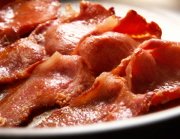
- Serving size- 1 cup pieces (82g)
- Calories- 313
- Calories from Fat- 206
- Total Fat- 23g, 35% DV
- Saturated Fat- 7g, 34% DV
- Trans Fat- 0g
- Cholesterol- 80mg, 27% DV
- Sodium- 1874mg, 78% of DV
- Total Carbohydrate- 3g, 1% DV ,
- Dietary Fiber- 0g
- Sugars- 0g
- Protein- 24g, 49% DV
- Vitamin A- 0% DV
- Vitamin C- 0% DV
- Calcium- 1% DV
- Iron- 10% DV
- Vitamin E- 4% DV
- Vitamin K- 7% DV
- Thiamin- 3% DV
- Riboflavin- 12% DV
- Niacin- 14% DV
- Vitamin B6- 13% DV
- Folic Acid- 2% DV
- Vitamin B12- 5% DV
- Phosphorus- 38% DV
- Magnesium- 6% DV
- Potassium- 9% DV
- Zinc- 17% DV
- Copper- 6% DV
- Selenium- 30% DV
- Water- 27g
Oscar Mayer Turkey Bacon Nutrition Facts
Oscar Mayer Turkey bacon nutrition facts show that it has lower calories than 1 slice cooked, baked pork bacon. Also it's total fat, saturated fat and cholesterol levels are lower. The sodium content could be considered to be a bit on the moderate-high side seeing as this 8% of your daily value (DV) is just for one slice. It is also a source of Protein and Vitamin C.
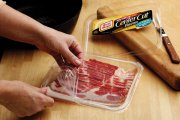
- Serving size- 1 slice (22g)
- Calories- 35
- Calories from Fat- 25
- Total Fat- 3g, 5% DV
- Saturated Fat- 1g, 5% DV
- Cholesterol- 15mg, 5% DV
- Trans Fat- 0g
- Sodium- 180mg, 8% of DV
- Total Carbohydrate- 0g
- Dietary Fiber- 0g
- Sugars- 0g
- Protein- 2g, 8% DV
- Vitamin A- 0% DV
- Vitamin C- 6% DV
- Calcium- 0% DV
- Iron- 0% DV
Bacon Nutrition Facts: Bacon, Egg and Cheese Biscuit
These are nutrition facts for McDonald's Bacon, Egg and Cheese Biscuit. The negative thing about it is that it is high in Total Fat, Saturated Fat, Sodium and extremely high in Sodium. As we mentioned earlier, these should be consumed sparingly. The positive thing about the McDonald's bacon, egg and cheese biscuit is that it's a source of Dietary Fiber, a good source of Vitamin A, Calcium and Iron. It is also a very good source of Protein, providing you with 42% of your recommended daily allowance of the nutrient.
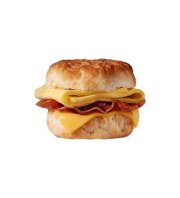
- Serving size- 1 order (152g)
- Calories- 480
- Calories from Fat- 279
- Total Fat- 31g, 48% DV
- Saturated Fat- 10g, 50% DV
- Cholesterol- 250mg, 83% DV
- Sodium- 1360mg, 57% of DV
- Total Carbohydrate- 31g, 10% of DV
- Dietary Fiber- 1g, 4% DV
- Sugars- 3g
- Protein- 21g, 42% DV
- Vitamin A- 10% of DV
- Vitamin C- 0% of DV
- Calcium- 15% of DV
- Iron- 15% of DV
Pan- Fried Pork Bacon Nutrition Facts
Pan-fried pork bacon nutrition facts reveal that it is a source of Protein, Niacin, Phosphorus and Selenium, amongst a few other minerals. Niacin is especially helpful in turning the food we eat into energy that our bodies need. Selenium amongst other things helps to keep your immune system healthy. The downside of pan fried bacon is that the amount of sodium is moderate to high, considering that this is just one slice.
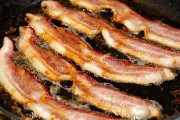
- Serving size- 1 slice (8g)
- Calories- 41
- Calories from Fat- 28
- Total Fat- 3g, 5% DV
- Saturated Fat- 1g, 5% DV
- Cholesterol- 9mg, 3% DV
- Sodium- 188mg, 8% of DV
- Total Carbohydrate- 0g
- Dietary Fiber- 0g
- Sugars- 0g
- Protein- 3g, 6% DV
- Vitamin A- 0% of DV
- Vitamin C- 0% of DV
- Calcium- 0% of DV
- Iron- 1% of DV
- Thiamin- 2% DV
- Riboflavin- 1% DV
- Niacin- 4% DV
- Vitamin B6- 2% DV
- Vitamin B12- 2% DV
- Pantothenic Acid- 1% DV
- Magnesium- 1% DV
- Phosphorus- 4% DV
- Potassium- 1% of DV
- Copper- 1% DV
- Selenium- 7% DV
- Zinc- 2% DV
Bacon Nutrition Facts: Bits meatless
Meatless Bacon bits nutrition facts reveal that they are a source of carbohydrates, Protein, Niacin, Potassium and Zinc. It is also a good source of Calcium, Selenium, Magnesium, Phosphorus, Total Folate and an excellent source of Dietary Fiber and Vitamin B6. However, the total fat and saturated fat contents are high and the sodium content is very high. You will need to be on the look out for this.
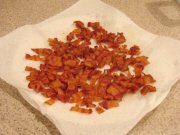
- Serving size- 100g
- Calories- 476
- Calories from Fat- 225
- Total Fat- 25g, 38% DV
- Saturated Fat- 4g, 10% DV
- Trans Fat- 0g
- Cholesterol- 0mg
- Sodium- 1770mg, 74% DV
- Total Carbohydrate- 28g, 9% DV
- Dietary Fiber- 10g, 40% DV
- Sugars- 0g
- Protein- 32g, 6% DV
- Vitamin A- 0% DV
- Vitamin C- 2% DV
- Calcium- 10% DV
- Iron- 0% DV
- Vitamin E- 20% DV
- Niacin- 5% DV
- Vitamin B6- 55% DV
- Folic Acid- 32% DV
- Potassium- 4% DV
- Phosphorus- 22% DV
- Magnesium- 24% DV
- Zinc- 7% DV
- Selenium- 10% DV
Bacon Nutrition Facts Hormel
Black Label 1 lb bacon nutrition facts reveal that it is basically a good source of Protein, providing you with 10% of your recommended daily value of the nutrient. Also, its sodium content is low which is a good thing. The cholesterol, saturated fat and total fat content is moderate to high.
- Serving size- 15g
- Calories- 80
- Calories from Fat- 111
- Total Fat- 7g, 19% DV
- Saturated Fat- 2.5g, 12% DV
- Cholesterol- 15mg, 22% DV
- Sodium- 330mg, 3% DV
- Total Carbohydrate- 0g
- Dietary Fiber- 0g
- Sugars- 0g
- Protein- 5g, 10% DV
- Vitamin A- 0% of DV
- Vitamin C- 0% of DV
- Calcium- 0% of DV
- Iron- 0% of DV
Pork Bacon Nutrition Facts Fat: Bacon Drippings
These are nutrition facts for pork cooked bacon with rendered fat (bacon drippings). As is expected, it's mostly fat and the levels of its total fat and saturated fat are high. It is basically a source of Niacin and Selenium.
- Serving size- 1 oz (28g)
- Calories- 251
- Calories from Fat- 251
- Total Fat- 28g, 43% DV
- Saturated Fat- 9g, 45% DV
- Trans Fat- 0g
- Cholesterol- 27mg, 9% DV
- Sodium- 8mg, 0% DV
- Total Carbohydrate- 0g
- Dietary Fiber- 0g
- Sugars- 0g
- Protein- 0g
- Vitamin A- 0% DV
- Vitamin C- 0% DV
- Calcium- 0% DV
- Iron- 0% DV
- Niacin- 1% DV
- Selenium- 2% DV
Bacon Nutrition Facts: Cheeseburger
These are nutrition facts of Burger King's Bacon Cheeseburger. They reveal that it is a source of Dietary Fiber, Vitamins A and C. It is also a good source of Calcium, Iron and an excellent source of Protein. You may just need to watch out for the sodium, total fat and saturated fat content. (You may want to compare with McDonald's cheeseburger!)
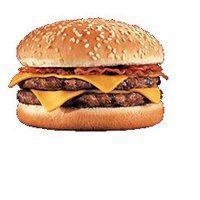
- Serving size- 1 serving (141g)
- Calories- 370
- Calories from Fat- 171
- Total Fat- 19g, 29% DV
- Saturated Fat- 8g, 40% DV
- Trans Fat- 0g
- Cholesterol- 60mg, 20% DV
- Sodium- 920mg, 38% DV
- Total Carbohydrate- 31g, 10% DV
- Dietary Fiber- 1g, 4% DV
- Sugars- 6g
- Protein- 20g, 40% DV
- Vitamin A- 6% DV
- Vitamin C- 2% DV
- Calcium- 15% DV
- Iron- 20% DV
Bacon Nutrition Facts Hormel
Black Label Lower Sodium 1lb bacon nutrition facts have shown that it's basically a good source of Protein, and according to its name, is quite low in sodium. Its cholesterol and saturated contents are fair.
- Serving size- 15g
- Calories- 140
- Calories from Fat- 80
- Total Fat- 7g
- Saturated Fat- 3g, 8% DV
- Trans Fat- 0g
- Cholesterol- 15mg, 5% DV
- Sodium- 230mg, 0.1% DV
- Total Carbohydrate- 0g/li>
- Dietary Fiber- 0g
- Sugars- 0g
- Protein- 5g, 10% DV
- Vitamin A- 0% DV
- Vitamin C- 0% DV
- Calcium- 0% DV
- Iron- 0% DV
Bacon Nutrition Facts Hormel
Black Label Center Cut bacon (12oz) nutrition facts have revealed that it also is a good source of Protein and is fair in its saturated fat and cholesterol content. Its sodium content would be considered to be on the moderate to high side seeing as this is just a slice.
- Serving size- 14g
- Calories- 70
- Total Fat- 5g
- Saturated Fat- 2g, 5% DV
- Trans Fat- 0g
- Cholesterol- 15mg, 5% DV
- Sodium- 300mg, 13% DV
- Total Carbohydrate- 0g
- Dietary Fiber- 0g
- Sugars- 0g
- Protein- 5g, 10% DV
- Vitamin A- 0% DV
- Vitamin C- 0% DV
- Calcium- 0% DV
- Iron- 0% DV

